Hannah Rasmussen's Blog
October 2, 2017
Dual citizen Christianity & political engagement

Photo from https://www.defense.gov/News/Article/...
I live in Kenya, but when the recent presidential election threatened to turn violent, I followed my US Embassy’s advice. I couldn’t participate with an alien card instead of an identity card, so escape was easy. My Kenyan friends joked, “You ran away, didn’t you?” All of them voted. But I didn’t vote in the United States’ election either – I failed to factor in weeks of shipping for an absentee ballot.
All this to say, I’m not a very good citizen of anywhere.
As a third culture kid, I’ve been a foreigner to some degree all my life. It’s hard to feel patriotic when you haven’t hardly lived in a country, but you haven’t lived down its stereotypes either. It’s hard to love a nation knowing immigration could deny you permission to stay.
But it’s also hard to form an identity without a place to belong.
As an alien on earth, I have found home among fellow Christians. I have taken comfort in being a citizen of heaven, a place where my wayfaring will end (see Hebrews 11). Being detached allows me to be more objective about controversial political disputes. I build bridges across cultural and political lines. But it that a cop out?
How do we acknowledge the supremacy of the kingdom of heaven and its claim on our identity, but still bring God’s kingdom on earth as it is in heaven?
Earlier this year, I decided to study Bible characters who we might call third culture kids today (most were also Hebrews 11 citizens of heaven). There was Joseph, the trafficking victim. Moses, the cross-cultural adoptee and fugitive. Daniel, forced to assimilate in captivity. Jesus, God with us in several human cultures. Paul, the diaspora local and foreign citizen.
Each of these people played huge roles in God’s mission. Joseph revealed God’s plan to Pharaoh and saved Israel from starvation. Through Moses, God displayed his power to all nations and led Israel to create a new culture in a new land. Daniel’s interpretation ended up in empire-wide proclamation of God’s reign. Paul communicated the inclusion of the Gentiles to them and to Jewish Christians. And Jesus reconciled God and humanity, of course. It fascinated me that none of these people could have achieved their mission in God’s kingdom had they not identified with their multiple earthly cultures. To be effective, they had to keep identifying with their captors, their betrayers, and their persecuted minority groups.
These Bible characters also all spoke God’s truth to rulers of their day – often the world superpower of the time. Whether through civil service like Joseph and Daniel, confrontation like Moses, or submission to criminal trials and punishment, they demonstrated that God’s kingdom can be proclaimed to the nations through the nations.
This drastically contradicts how Christians have at times withdrawn from society, focusing on personal piety, and pinning our hopes on the afterlife. It’s tempting, especially when our privilege protects us from the effects of the politics of the day. When I left Kenya, I demonstrated more concern for my safety than solidarity with my Kenyan friends. When we escape as Christians, we exclude ourselves from the world God gave us to steward. Don’t we follow the one given all authority on heaven and earth? Yet we tell the world that we’re more concerned for our own survival than their welfare.
We are all citizens of heaven and earth. Our dual citizenship should change our civic engagement. We should be different from other citizens of our country, because we also have allegiances and civic duties from another kingdom. Jesus’ attitude toward taxes demonstrated that God ultimately reigns, but he respected the authority of human religious leaders and kings by doing his civic duty. (Matthew 17:24-27, 22:15-22). The early church struggled with these questions too. On the one hand, they often refused to serve in the Roman army or government to avoid swearing oath to Caesar as Lord, and refused to participate in social events that glorified violence and sexual immorality. Yet they engaged in social issues. They rescued babies abandoned to die. During two major plagues, they stayed to nurse the dying while pagans fled. They wouldn’t pray to the emperor, but they prayed for him.
What does dual citizenship look like for us today? The day the Kenyan election results were announced, the news also featured white nationalist protests in Charlottesville, Virginia. Throughout 2017, the pressure in both countries has threatened to tear them into identity groups and political tribes.
As many parts of the world face divisive times, our dual citizenship means Christians shouldn’t completely blend in with our political tribe, racial group, or ethnic community. We should also find identity and unity as Christians. Biblical values should inform how we together respond to injustice and to earthly authority. How does God’s reign inform our involvement in social issues, politics, and work?
On the other hand, we can celebrate and preserve our earthly cultures to make our worship truly heavenly. Eminent African theologian Kwame Bediako said, “In becoming Christian I discovered I was becoming African again. I was recovering my sense of the spirituality of life. I was recovering my sense of the nearness of the living God. I was recovering my African sense of the wholeness of life. I find in becoming Christian, I am being more African than I think I was. I am being more who I am.” There is a way, somehow, for being a Christian to push you to improve your nation without making you nationalistic. There is a way, somehow, to live for God in the state.
As a third culture kid, when people ask, “Where is home?” I can’t choose. Truly dual citizenship allows you to embrace both the present and the future home. Dual citizens revitalize our countries, anticipating the day when we will all sing our mother tongue without conflict or tears. We work in anticipation of the day the nations themselves are redeemed to display the diverse glory of the King.
Now that’s an inauguration to look forward to.


April 20, 2017
Impossible with God: The Africa Study Bible launch
Coworker Nyambura and I celebrate a big achievement & our big God
To be honest, there were times I doubted we would ever launch the Africa Study Bible.
A study Bible is the most complex possible type of publishing project. The layout must juggle the Bible text, notes, cross-references and more. You have to print on very thin paper with special printers. And all the notes have to be extremely high quality theologically and grammatically because they’re bound up with the Word of God.
But this was more than a typical study Bible. We designed six different types of unique features to connect the Bible to Africa, so we had to teach our writers to see the Bible differently as they wrote. And no one has ever produced a study Bible with 350 contributors, much less from 50 countries writing notes in 5 languages.
Compared to this task, our resources were tiny. Our small organization had to invent the entire project management infrastructure from scratch for this unprecedented feat. We wanted the top scholars, respected pastors, and influential ministry leaders from Africa involved, so they all did their part on top of their normal busy commitments. When a writer missed a deadline, it could be due to power outages, malaria, or bereavement. We struggled to find writers from some countries because they were facing civil war or religious persecution.
At one point, I was incredibly overwhelmed with a sense of personal responsibility for the project. After a late Skype call with colleagues, I walked home and put my briefcase down on the grass outside my house. I looked up at the stars and cried. “God, I can’t do this. This is your project. You started it. I surrender. You’re the only one in control. If you get this project done, I’m going to give you all the glory, because there’s no way we can do this on our own.”
On days when it looked impossible, I jotted down how God was at work and reminded myself of the end goal. I couldn’t think as abstract as discipling the continent, so I literally pictured the spine of the Africa Study Bible on my bookcase. “This will get done,” I said to myself. “One day, I will be able to hold the finished product in my hands.”
On March 30, the Africa Study Bible was launched to the world!
Church leaders from all the major ecumenical groups, leaders of several Christian ministries, and seminary scholars gathered in a hotel ballroom in Nairobi, Kenya. Guests and ballroom alike were decked out in African colors and patterns. We sang together, “When Jesus came down from heaven, he landed in Israel. When there was trouble, he came down to Africa. So we must praise him – praise him in an African way!”
I rejoiced to meet contributors in person who I had emailed for months. I couldn’t help but notice that the 350 seats in the room represented our 350 contributors. The few empty ones reminded me of so many who had been involved in the project – our French writing coordinator, half of our review team, key editors…. They would attend the Ghana, US, Nigeria or South Africa launches. The little taste made me hungry for our complete reunion in heaven.
As we celebrated the momentous occasion, we remembered where we had come from and where this was going. A youth pastor gave a devotional, highlighting our African Christian heritage from Augustine to his grandma. He reminded us that youth are the Africa of today, not tomorrow – and this Bible roots them in their identity and the word of God. A government minister for education spoke of his vision for using the Africa Study Bible as a key resource as they reform the national curriculum to teach children values. Christians from three generations passed a kerosene lantern along, praying that the Bible would illuminate hearts for years to come.
Then the unveiling. Lights dimmed and pulsed. Young people robed in red Maasai shukas and traditional kanga wraps danced in to a drumbeat. The audience stood and clapped along. The ribbon was cut, the veil was lifted, and the larger-than life Africa Study Bible twirled around like it had jumped into a dance circle. We sang a Nigerian song with hands and hearts lifted, “Imela! Imela!” Thank you, my king!
After all the celebrations, my US and Kenya coworkers went out for a relieved and grateful dinner. Laughing around the table, I realized these people have become my people, almost family. Yet we might never all eat together again until the kingdom of God comes again. We sang a hymn before we departed: Praise Father, Son, and Holy Ghost.
When I got home, I put my briefcase down on that eventful spot of grass and took off my shoes. Hands up and teary eyed, “You did it, God!” I jumped and spun, dancing under the stars. “Hallelujah!”
And when I went inside, I opened the pages of my very own copy of the Africa Study Bible.
[image error]


April 3, 2017
Perfect Timing
Shooting from inside a moving car by Jenny Mealing via Flickr (CC by 2.0) https://flic.kr/p/9Yvaev
Ever last minute,
family weighs
2 suitcases exactly 50 pounds each
against 3 hours early to the airport.
Off like a herd of turtles
into Mombasa Road traffic
I drive
to squeeze
in the last moments together,
goodbye,
I love you.
See you on the other continent.
My passenger seat is empty
a tentative text that I’m in the area
since I know he works downtown.
A long shot.
As I pull away
he calls just leaving work
quick pick up line.
Discover we’re going the same direction
ready for home
delighted to have company.
Squeeze in a few moments together
before his bus stop
see you later
and we finish the journey alone
to rest at last.


March 11, 2017
Animals in the era of the Gutenberg Bible
Inspired by old Bibles: printed with ink and sometimes gold foil on linen or vellum paper, bound in leather, and sometimes nibbled on the shelves
[image error]
Gutenberg Bible 02 by JMWK via Flickr (CC BY 2.0) https://www.flickr.com/photos/36435193@N07/3517373312
The mice know
taste and see that the Lord is good.
The bookworms
find refuge, God is their hiding place.
The sheep
has written the law on its heart.
The cow
lets the word pierce between bone and marrow
Saying,
“Let my body be a living sacrifice
consuming and being consumed by
the Word.”
And the word is holely,
not solely locked behind glass
in a library but grass.
Yes pieces of it were in the
‘adamah
once the worms that ate it decayed
and they fed the green pastures
where the shepherd let his sheep lay down.
And the sheep laid down its life
and was bound with cords
on the altar
to free the people
from ignorance.
The word was living and active,
the word became flesh
and it was created from gold dust
it was earthy
and uncontainable
as precious as delicious.


October 27, 2016
Destined to edit books for the church in Africa
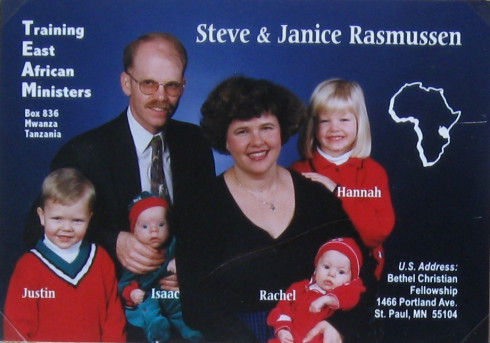
Our missionary family “prayer card” – about a year after my salvation
Last month, I moved into a new associate acquisitions editor position at Oasis International. Over the weekend, I realized that God has been preparing me for this for twenty years!
I moved to Tanzania as a two-year-old and grew up there as a missionary kid. When I was four – exactly twenty years ago this weekend – I decided to follow Jesus. I don’t remember it, but my dad recently unearthed his old journal and came across the night I became a Christian. Earlier this year I noticed the file on my computer, realized this would be twenty years, and decided to celebrate my “re-birthday.” So I read over what my dad had written:
October 22, 1996 Hannah is 4
Dear Hannah,
I want to write this now for you to read later so you can remember what happened tonight. Tonight at bed time you wanted to read your Swahili book and they you wanted to read a book that your Sunday school teacher at the PEFA church next door gave you awhile back. (We had never read it before.) It was in English even though he only speaks Swahili. It was about heaven and hell and a little African boy named Mutu having salvation explained to him. You and I had talked about heaven and that Jesus died for us and what that means.
My dad writes that he explained the gospel in four-year-old terms and we prayed for my salvation.
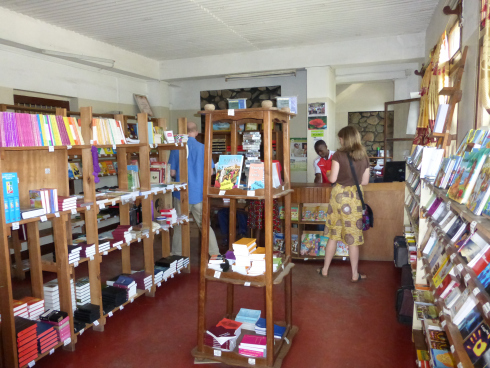
Mutu’s story might have come from this Christian bookstore in my hometown in Tanzania
I shared this story with a friend, who noticed, “Books have been part of your story from the beginning.”
“Wow, I never thought about that. This was even before I was reading on my own. But I guess they have!”
And as I thought about it more, I realized that it wasn’t just any book. It was a Christian book written in English, contextualized for Africa, distributed to me through a local pastor. It was exactly the literature that Oasis creates and distributes! Jesus saved this little American-African missionary kid through the same work that I do now!
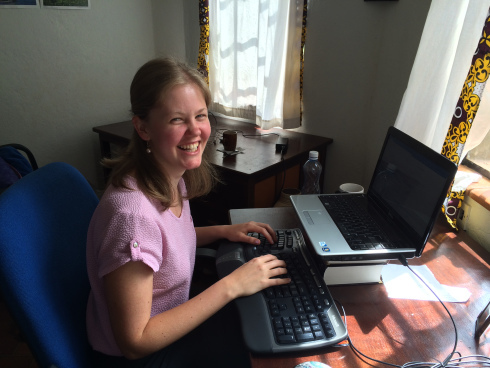
Editing Christian literature for Africa from my office in Nairobi, Kenya
From there, God weaved the rest of the story together: The second-grade teacher who told me I’d become a writer. The pastoring grandparents who always gave me Christian books for my birthday. The many childhood visits to village churches. My preteen years on a seminary campus where my friends biked to the bookstore for candy, browsed the shelves, and made our faith our own. The last-minute English major in college and the unexpected call to ministry. An Oasis job opening after graduation asking me to move back home to Kenya – literally to my parents’ house. Getting sick of Pulitzer winners and discovering African fiction. Multiple people randomly telling me last summer that I should go into acquisitions editing.
How does God do it? Not only saving me and continuing to affirm our relationship as I grew up, but designing the way I was saved to chart my destiny? I’m so in awe. I felt like I stumbled into this path, but what a comfort that God has known all along where we’re going!
So all I do is echo Ephesians 3:20: “Now to him who is able to do immeasurably more than all we ask or imagine, according to his power that is at work within us, to him be glory in the church and in Christ Jesus throughout all generations, for ever and ever! Amen.”


October 10, 2016
Is God Silent When Women Suffer?

Self Portrait by Jane Fox via Flickr (CC BY-ND 2.0) https://www.flickr.com/photos/runjanefox/9214235312
*trigger warning*
There is a terrifying story of sexual assault in the Bible. David’s son Amnon burns with lust for his half-sister Tamar. His friend Joanadab advises Amnon to pretend he’s sick and bedridden, say he’ll only feel better if Tamar spoonfeeds him, and then rape her when they’re alone. And that’s what happens.
Is God silent while an innocent person is raped by someone they trusted? Countless survivors have asked that question.
My book was launched last month at a conference in Johannesburg called “Truth Be Told: Speaking Out Against Gender Based Violence.” But Pastor Pelham Lessing made us ask: Does God speak out against gender-based violence?
As he explained the passage, he showed how Tamar tells Amnon not to rape her – and she is teaching Amnon the Old Testament law that condemns both rape and incest. When he tells her to get out afterwards, she refuses, again referencing the law that a man had to pay the bride price if he raped a woman. She wails and mourns throughout the palace, and lives the rest of her life in protest. She is the voice of God in the passage. God executes poetic and literal justice – Amnon dies in a violent attack from a sibling. Her brother dies quickly, but Tamar is a survivor.
Despite the fact that this was the heir to the throne, God preserved this woman’s words and testified to her innocence for all time! God is on the survivors’ side, speaking through them. (We had better listen when they speak.)
I expected a conference about gender-based violence to be heartbreaking. And there were moments of that. When we see – really see – even part of the suffering in the world, it can threaten to tear our souls apart. We can ask: “God, why aren’t you doing something?”
But at this conference was full of hope. I saw God speaking, doing something – through the people of God.
I saw how Linda sews figurines to animate a stop-motion video about Bible scholarship on women in Ephesus. How biologist Rev. Patti Ricotta teaches Ugandans how Female Genital Mutilation prevents the oxytocin release and bonding that God intended for spouses.
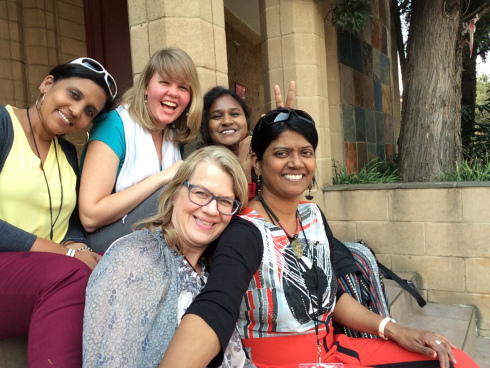
Pastor Kavitha (left) with teammates and new friends
All around the world, God’s Spirit is raising up people who say “enough is enough” to gender-based violence in their communities. Pastor Kavitha Emmannuel’s non-profit Women of Worth fights the domestic violence, rape, sex slavery and dowry practices in India. Their “Dark is Beautiful” campaign to improve self-esteem and end skin color bias went viral internationally.
With wit and hard facts, Lynn van Rooyen examined the connections between AIDS and gender-based violence. As the leader of the Christian AIDS Bureau for Southern Africa, she challenges the church to promote spiritual and physical wellbeing.
I rejoiced at Emma Smith whose started a protection program to educate churches and provide support for the many women raped in Eastern DRC. And how God provided her an English-speaking coworker Fred, a Congolese man who was already running what he called “Tamar Bible Studies” in his village!
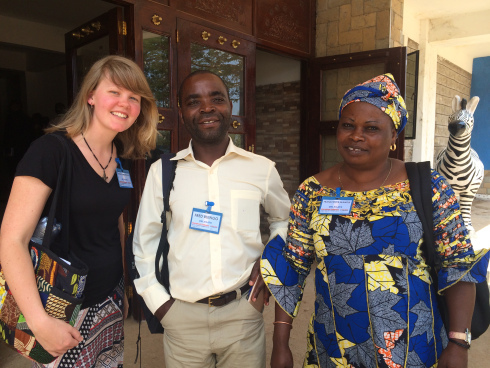
I met Fred and his coworker Francesca at the parallel conference in Kenya
I literally sang and danced in my hotel room: “God, you are good! What divine wisdom and power you have to weave people together around the world! You care about your people’s suffering and you are doing something about it through your church!”
I saw what happens when the talents and passions of the whole church are unleashed. So God is not silent… unless we silence God. If we ignore the Tamars that God is using, violence continues. We must not silence half the church, cannot restrict what women can do, or we will never stop gender-based violence. We need everyone we can get, doing whatever they do best, to their full potential. We need gender equality within our churches because it is through us that God wants to bring peace and justice to the world.
Then the body of believers will “build one another up in love, as each part does its work” (Ephesians 4:16) – and how beautiful that will be!


October 9, 2016
What You Never Knew about Proverbs 31
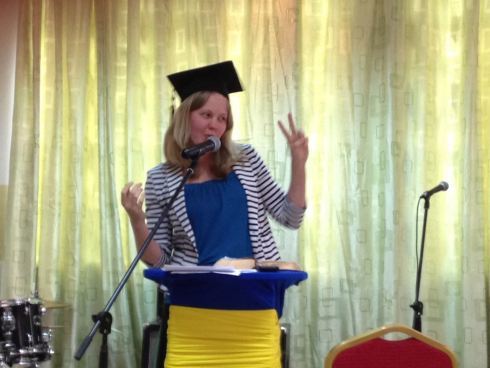
“What two things is a young man concerned about when he graduates?”
Proverbs 31 isn’t primarily for women. If anything it instructs young adults in how to lead a successful life! I rediscovered Proverbs 31 and it blew my mind. This chapter of the Bible is an insanely clever poem encouraging us to seek God’s kingdom first. It weaves into the salvation story & Jesus’ heritage. Watch my full sermon on YouTube here (props, Kenyan accent, family tales and all)!


September 28, 2016
Can writing about equality right gender-based violence?
I missed the registration deadline. Plane tickets were sold out. The hotel was fully booked. The leadership training was full. Over and over, I almost missed out on the “Truth Be Told” conference in Johannesburg, South Africa. So when I arrived, I knew God must have something special in store.
I was very excited – my book Good News about Gender was launching at the conference! But I basically expected to stand at a booth, sign some books, hear cool speakers, and collect a wad of business cards.
Well, was I in for a surprise! I ended up with several posts-worth of revelations (so stay tuned for the next two)!
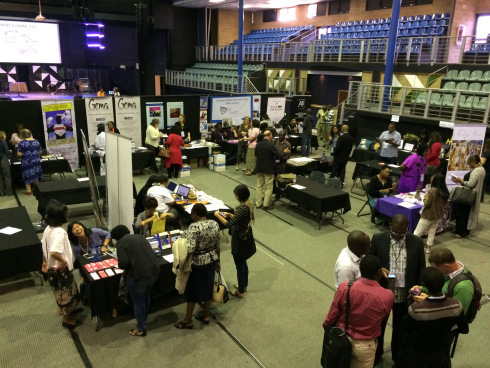 It was no mistake that Christians for Biblical Equality and Gender Equality Matters hosted a conference in South Africa with the theme “Truth Be Told: Speaking Out Against Gender-Based Violence.” South Africa has high rates of sexual assault and domestic violence, but many of its neighbors also look to South Africa as a leader in economic development.
It was no mistake that Christians for Biblical Equality and Gender Equality Matters hosted a conference in South Africa with the theme “Truth Be Told: Speaking Out Against Gender-Based Violence.” South Africa has high rates of sexual assault and domestic violence, but many of its neighbors also look to South Africa as a leader in economic development.
Yet as we saw in the conference speakers, post-apartheid South Africans are also highly conscious that ideas of inequality lead to discrimination and violence. “Ideas have consequences,” Mimi Haddad emphasized. She told the story of evangelical social justice activist Katharine Bushnell, who emptied brothels in the 19th century only to find them full the next day. Eventually, Katharine realized she needed to work “upstream” by tackling the theological misinterpretations that justified gender inequality.
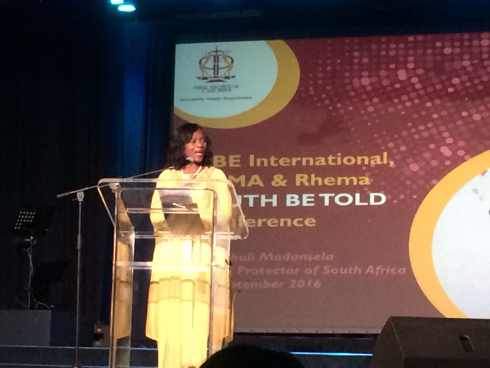
It sounds obvious, but this conference reminded me that gender-based violence is the natural and nearly inevitable consequence of beliefs that women are inferior to men. Adv. Thuli Madonsela (above) explained that when we create a hierarchy where some people – simply because of the bodies they are born with – deserve a better life than others, then anyone who steps out of “their place” threatens the system and must be subjugated with violence. You cannot believe that women are in any way subordinate to men and yet expect them to receive equal treatment in society. Remember “separate but equal” in US history?
Suddenly I remembered why I wrote Good News about Gender. It wasn’t just to advocate for myself or defend my call to ministry. Sometimes I get tired of complaining about gender issues when I have a very privileged life in so many respects. But I realized that the reason I have such an amazing life is because my parents, my grandparents, my university, and my church all lived out the belief that women have equal value to men. My education, employment, and self-esteem is a testament to the effects of egalitarian views.
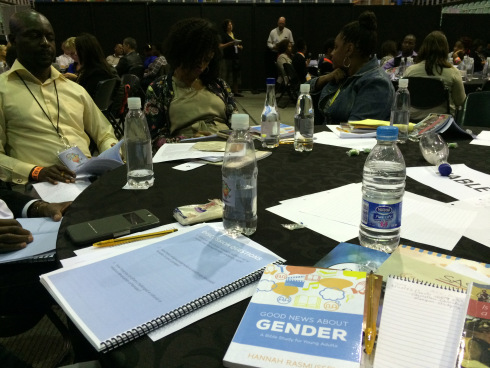
And my egalitarian upbringing is also why, when I saw women and girls in my church or school be mistreated verbally and physically, I knew they didn’t deserve it. It just took me a decade to figure out that the Bible was saying the same thing. Now I realize that, to the extent that my family and my society believed in equal treatment, they did so because they thought that all people were created equal, that is, made in the image of a Creator. Our practice springs from our ideology. In Jesus’ words, “Each tree is recognized by its own fruit.”
Writing Good News about Gender is not just a drop in the bucket compared to all the direct-service work addressing gender-based violence. And it’s not a trickle-down effect that leaves the masses thirsty. The reason the theology of gender equality looks small is because it’s upstream. Downstream, justice flows like a river.
…but that’s not all I learned at the Truth Be Told conference! Follow me to make sure you hear the rest of the story!


August 25, 2016
Dear Nairobi

Arthurbuliva at en.wikipedia [CC BY-SA 3.0 (http://creativecommons.org/licenses/by-sa/3.0)%5D, via Wikimedia Commons
Dear Nairobi,Siku hizi you’re growing on me.
I grew up next door in Mwanza, Tanzania
so we’d always been family friends
waving at the dentist, guest house, summer camp.
But I thought you were a Western wanna-be.
When you met me at the airport when I was 16,
You said, “Jambo! Karibu!” and I corrected you with, “Sijambo.”
I didn’t want to like you
couldn’t betray Mwanza by forgetting farewells.
The “Mzungu!” unspoken on the streets still chanted in my head
my closet still clothed me in ankle length skirts on Sundays
and Sukuma was a tribe or a verb, not a vegetable.
But this small world gave us a second chance.
This time I listened to your story, learned to name your plants and people.
I trained my reflexes to respond to your roads
and my mouth to greet with the slang Sasa? instead of Shikamoo.
I styled up with polished work shoes and MPESA.
Yet maybe I was not so much settling
as discovering a soul mate
who dances to Swahili songs in church but speaks English
who eats passion fruit, yogurt, kimbap, chapatis, and burritos
who listens to the BBC and Christian hip-hop on the radio.
We’ve got a lot in common.
I can run with you all year ‘round.
We both enjoy poetry slams.
You accept me as a Pentecostal and a professional woman.
We buy books at coffee shops and haggle at used clothes markets together.
You can relate to
my British education, Indian classmates, and missionary worship nights.
I guess we’ve had a similar identity crisis!
My family knows you
and my old friends are always coming from out of town to visit you.
I know you have your secrets and regrets
but we’ve grown in the same direction.
Siku hizi you’ve grown on me.
Maybe one day we’ll make a home together.


June 18, 2016
No Fail Too Epic

“Head in Hands” by Alex Proimos CC 2.0 via Flickr
Moving from one country to another, I’ve often identified with Jacob’s prayer for God’s protection and provision as he runs away from home. But just lately, the earlier part of Jacob’s story in the Bible challenged me.
While Jacob and his twin Esau are in the womb, God tells their mother Rebekah that the older brother will serve the younger. As soon as Esau leaves the womb, it is clear that Jacob is the younger. Jacob is chosen by God before he is born. He does nothing to deserve that blessing.
Yet the rest of his life he keeps acting like he has to earn it. He acquires a firstborn’s inheritance rights by taking advantage of Esau’s hunger. He tricks his father into blessing him, again by feeding a family member at the opportune time. Then he runs away from home because his brother is angry enough to kill him. He works for his uncle Laban, using superstitions methods to increase his herds. When he meets Esau again, he sends ahead a parade of pacifying gifts. He had asked God for provision and protection, but when it comes down to it, he trusts his own conniving.
Yet God keeps turning these mistakes and selfish actions towards his initial plan – to make Jacob into a nation. Maybe if Jacob hadn’t been such a grasper, God’s plan would have happened in a straightforward way – perhaps receiving blessing without a brother’s death threat. But God gave Jacob the freedom to take the inefficient path to blessing if he so chose. Or maybe God knew all along how Jacob would acquire the blessings. But God chose him anyway.
Jacob’s sons weren’t born in happy succession either. Jacob was tricked into marrying both of Laban’s daughters – two rival sisters. Leah and Rachel kept bearing sons as a way to compete for the affection of God and their man. God used the family’s trickery and rivalry to birth founders for the twelve tribes of Jacob, also called Israel. Perhaps another way would have fostered more brotherly love. But then maybe they wouldn’t have sold one brother into slavery in Egypt, who strangely later saved them from famine. Maybe Israel would have starved before it got started.
Why did God use selfish tricksters and jealous siblings to build his people? It’s not a great fireside story about a nation’s founding father.
Or maybe it is. Maybe the point is to remind God’s people that they would keep trying to help themselves, but they didn’t need to. That even if they went wrong, God was committed to his end of the deal. As long as they were his people and he was their God, he would recycle their mess in super creative ways.
I am scared of messing up. What if I don’t choose the path God has for me? We fear the wrong college, career path, or relationship. Why did I do that stupid or selfish thing? Surely God can’t work with me now.
But God can. God wants us to obey him because it’s a lot better for us in the long run. I’m not saying that we can turn our backs on God or that we will avoid all consequences for our mistakes. But our actions do not make such a big difference that God can’t transform them for his own ends. We keep thinking we have to earn everything, but God gave us his love and forgiveness before we did anything to deserve it. If we’re sincere about wanting to follow God, he’ll work everything out for our good in the end. We can trust that things will go according to the plan of this God who controls everything. We are free to try and to fail and to fall into a cosmic net of grace.





